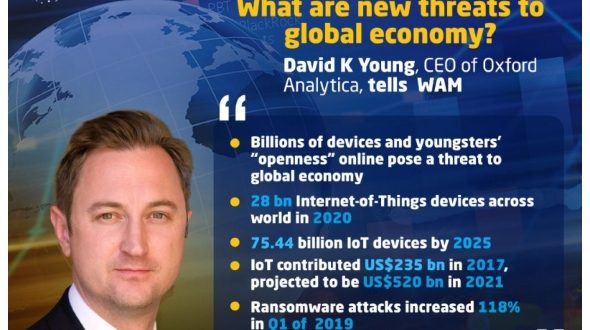The total number of around 28 billion Internet-of-Things devices across the world in 2020 is expected to increase to 75.44 billion by 2025, which will pose a major cybersecurity threat to the global economy, an expert told Emirates News Agency.
As billions of smart devices are interconnected, hackers can target any financial institution through a vulnerable device that does not have adequate cyber security, said David K Young, CEO of Oxford Analytica, an international geopolitical advisory firm providing strategic analysis of world events.
Along with the increased number of smart devices, the young generation’s “openness” in cyber world further makes global financial systems vulnerable to cyberattacks, he pointed out in the interview at the Foreign Correspondents’ Club of the UAE, FCC, in Abu Dhabi.
“Unlike the previous generation, the youngsters now are less concerned about ‘digital privacy’ and expose their personal and sensitive data online, especially on social media. Hackers can use those data for cyberattacks,” he explained.
“Smart devices connected through 5G [the fifth generation wireless technology for digital cellular networks] and IoT [Internet of Things] will make people’s lives easier and contribute billions of dollars to the global economy,” he noted.
IoT devices can connect wirelessly to a network and have the ability to transmit data. 5G technology helps control more devices remotely in applications where real-time network performance is critical, such as remote control of heavy machinery in hazardous environments, thereby improving worker safety, and even remote surgery, according to industry experts.
IoT contributed $US235 billion in 2017, which is projected to increase to US$520 billion in 2021, according to some studies, he said. “The 5G rolled out in 2019 is also expected to make similar contributions.”
However, at the same time the devices pose a threat to the global economy as they leave the cyber systems vulnerable to cyberattacks, unless enough cybersecurity measures are undertaken, Young explained.
Apart from technical cyber security measures, offering awareness and training for gadget users is the solutions to this problem. As an institutional mechanism, organisations have to put in place standard procedures for cybersecurity, he said.
“Addition of each device in the world may enhance the cybersecurity threat,” he warned, noting that ransomware attacks have already increased in recent years.
Ransomware is a type of malware (malicious software) that cybercriminals use to hold people to ransom. Once a computer or network is infected with ransomware, the malware blocks access to the system, or encrypts the data on that system. Cybercriminals demand that the victims pay a ransom in order to regain access to their computer or data.
Such attacks increased 118 percent in the first quarter of 2019, compared to the same period in 2018, Young said.
According to a CNBC report in October 2019, cyberattacks costed businesses of all sizes $200,000 on average, and it might cost businesses $5.2 trillion worldwide within five years.
In a latest such incident, foreign currency firm Travelex was forced to take its websites offline after discovering the cyber-attack on New Year’s Eve. The online travel money services of companies that use Travelex, including Royal Bank of Scotland, Barclays, Tesco Bank and Asda were also affected.
It later emerged that the ransomware gang had demanded ₤4.6 million (US$ 6.01 million) and was threatening to release customers’ personal data – including dates of birth and payment card information – into the public domain unless the company paid up, according to a report in The Guardian on 13th January.
The company website said on Wednesday it contained the virus and was working to restore the systems and resume normal operations as quickly as possible.
A New York Times report last year quoted government and private experts as saying that the ransomware business was proving so lucrative that the hackers were pouring some of their profits back into their own research and development, making their attacks more precise, and more wily.
 UAE BARQ برق الإمارات – نبضك
UAE BARQ برق الإمارات – نبضك


